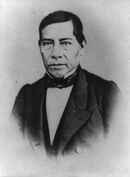Large landowners were benefited by the progress of Latin America. Rural workers, on the other hand, ended up becoming more impoverished due to the lack of freedom to farm as they pleased. This often forced them to become workers on the large plantations that oversaw everything they did. Slaves who were freed also had many struggles socially. While they lived in the poverty areas of larger cities, so did new immigrants from Europe. This caused friction and some considered the new immigrants a threat to the middle class. Women also gained substantial progress during this period. Due to the progress, women had many opportunities to expand their education and their social status even though that progress developed slowly. Therefore, there were very few women that gained a crucial role in society. However, once they possessed the leading role, they made significant contributions.
Benito Juárez

Benito Juarez
Benito Juárez showed that the people of Latin America could in fact succeed if enough effort was put towards it, but he left his old indigenous identity behind him. Juarez was the "first person of fully indigenous ancestry to become governor of a Mexican state" (Chasteen, 156). As a young boy, Juarez accepted his Zapotec heritage, but as he grew older, he realized that in order to obtain power in Latin America, a person had to resemble the Iberians. This included having lighter skin, being fluent in Spanish, and being well-educated and literate. After he recognized that this change must take place, he did everything he could to become more like the Spanish. He powdered his skin to lighten it, attended Oaxaca's university, and donned European apparel. At the time, this sent a message to the indigenous people by indicating that their ways of life were not acceptable in this progressing society and that all Latin Americans with native roots would need to hide their true selves to become more like the Europeans. While Benito Juarez's actions were typical of the time, it was not what the people of the Latin American countries wanted. Eventually, covering up the indigenous roots would lead to an intense phase of nationalist ideas, where there was no foreign influence and native ancestry was praised rather than hidden. Juarez became a symbol that represented progress. The idea during the progress era was that Latin Americans could become something much better (i.e. the European way of life), but they would have to leave their former selves behind. This central idea builds upon past and future themes, where the Latin Americans become more dependent on others, instead of just accepting themselves and working towards a common goal of the people.
Juana Manuela Gorriti

One of the more well known women during this time period was Juana Manuela Gorriti, an Argentine writer during the 1800s with extensive political and literary links to Bolivia and Peru. Her “feminine” writing created connections between herself and the struggles of women in Latin American society. Coming from a wealthy family, her father, Jose Ignacio de Gorriti, was a politician and a soldier. They were living under the control of the caudillo, Facundo Quiroga, when he forced her family to move to Bolivia. She was married at the age of fifteen with a dark young man named Manuel Isidro Belzu, who was also a Bolivian army captain at the time. She moved back to Peru where she started to teach and publish her writing. In Lima, her journalism became influential. She founded and hosted tertulias, an event in which fashionable men and women came to discuss Literature, progress and listen to music and drama. Throughout her writing, her main focus was on progress, and she inspired women to stand up and take the lead in the society. She wanted them to educate themselves and to break the status quo about women. She did not only served the society as a journalist, though. In 1866, when the Spanish Navy attacked the coasts of Chile and Peru, she served as a battlefield nurse. She had risked her life to save and evacuate the wounded out of the battlefield. In 1878, she moved to Argentina where she divorced Belzu and raised their child without remarrying. Gorriti is remembered as an influential journalist who has made great contributions to the society, despite the norms that women were incapable of becoming anything inspirational to society.